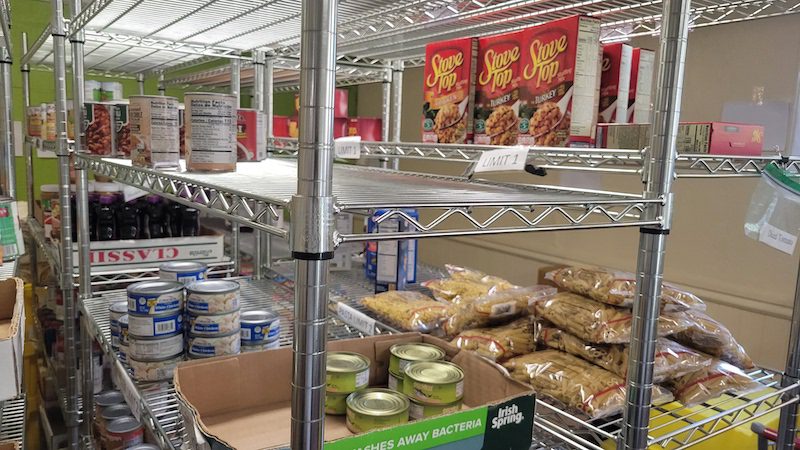Wayside’s Sophia Suarez-Friedman in the Watertown News on Food Insecurity
Watertown’s Hidden Problem: Food Insecurity Among Us (First Part of a Series)
By Charlie Breitrose | December 11, 2023
 Food on the shelfs at the Watertown Food Pantry, which has seen an increase in the number of people using its services since the start of the Pandemic. (Photo by Charlie Breitrose)
Food on the shelfs at the Watertown Food Pantry, which has seen an increase in the number of people using its services since the start of the Pandemic. (Photo by Charlie Breitrose)
For many, Watertown is a destination for food and eating, with dozens of restaurants, markets small and large, and a farmers market through the warmer months. However, a significant number of residents have trouble affording to feed themselves and their families.
The hunger problem in Watertown is often not visible, but those who provide assistance and services to people in need have noticed a recent increase in the number of people in town facing food insecurity, spiking during the Pandemic. And, while the COVID cases have dropped, the numbers of people going to Watertown’s two food pantries, or needing help to put enough food on their table has remained at about the same level.
Watertown has found some ways to help people have enough to eat, both traditional efforts, including Food Pantries, and new ones, such as the Community Fridge and programs funded by the Watertown Community Foundation to deliver food to some of the City’s most vulnerable residents. Some of these programs, however, will be coming to an end as post-Pandemic funds dry up.
Watertown News and Watertown Cable Access Television joined forces to look back at the rise in food insecurity, speaking to those making use of the local and state food insecurity programs, the people on the front lines providing help, and sought to find out what else can be done. This story is the first in a six-part series on food insecurity, and Watertown Cable will be producing a series of programs looking at the issue airing at a later date. The series is made possible, in part, by a grant provided by the Watertown Community Foundation.
The Pandemic Spike
The Pandemic brought some issues in Watertown into focus, said Jan Singer, the former executive director of the Watertown Community Foundation.At the dawn of the COVID-19 Pandemic, Singer remembers gathering her board members to workout how the organization could help the community weather the Pandemic. They looked at ways to provide COVID kits to those who had tested positive, computers for families who needed it so their children could participate in remote learning, and emergency funds for things like rent, utilities, and food.
Food insecurity was not unknown before March 2020, Singer said, who said the WCF was working with the Watertown Public Schools to send students home with backpacks full of food for the weekend. The program was aimed at children of families in the Watertown Public Schools who qualified for the free lunch through the federally funded National School Lunch Program.
“We had a special grant for this from the Perpetual Benevolent Fund,” she said. “We brought their board members in to see how we were doing it and what was going on, so food insecurity was an issue long before the Pandemic and when the Pandemic hit it just exacerbated it and it has not stopped.”
Kathy Cunningham, coordinator of the Watertown Food Pantry, said she has seen many more people use the pantry in the last few years.
“So, when I first began here, we were doing 40 families a week …” Cunningham said. “And then it graduated up to probably 70 families, and then once the pandemic hit, we were running approximately 200 families every single day that we were open, which was okay. It was fine. We made sure that we did a lot of outreach. We had a lot of feeder programs. We were never without, we never let anybody go hungry or anything on that level.”
After people got back to work and things began to return to normal after the Pandemic, the number of families the Watertown Food Pantry served began to decline, but did not return to previous numbers.
“So after the COVID and things are starting to get back to normal, such as the children attending school, I would say we probably leveled off at around 180 a week, for probably six, seven months at least,” Cunningham said. “And now we’re averaging between 140, 160 each week.”
The Watertown Food Pantry, located in the basement of the former Methodist Church near Watertown Square at 80 Mt. Auburn St., is one of two pantries in town and is open on Tuesdays from 10 a.m. to 2 p.m. The other is run by the Catholic Collaborative in the basement of Sacred Heart Church, 770 Mt. Auburn St. in East Watertown on Thursdays from 10 a.m. to 11:45 a.m.
During the Pandemic, another food source became available, a grass-roots community effort called the Watertown Community Fridge. This started near Francis Market on Belmont Street, and then moved to the same church that houses the Watertown Food Pantry. Food is put in the fridge, an is available for free to anyone. Also, people can donate fresh, frozen, and non-perishable items.

